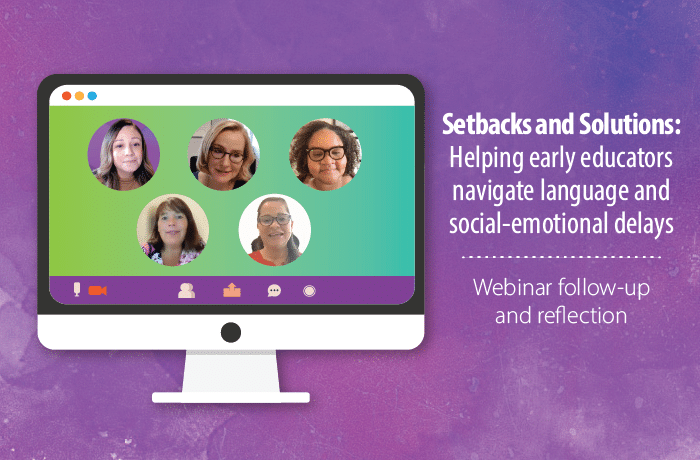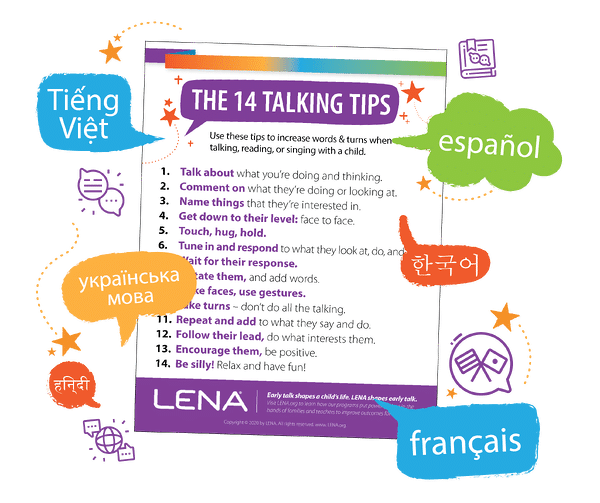A national poll of audiologists and speech language pathologists working with children aged birth to five has shown “an increasing number of children with behavioral, social, and language difficulties.” In addition, independent studies have revealed that babies born during the COVID-19 pandemic experience fewer conversational turns than their pre-pandemic peers. This, as LENA’s Chief Research and Evaluation Officer, Jill Gilkerson, told The Economist in 2022, is “a red flag.”
At the same time, the first wave of “COVID babies” is getting closer and closer to kindergarten. And more and more infants and toddlers are returning to child care, where one in five children experiences language isolation.
What does this mean for early childhood educators?
In part, it means they need practical, innovative strategies to address language and social delays. And it means these strategies need to be easy to implement and even easier to maintain.
A growing number of early educators and advocates say LENA Grow, an evidence-based professional development program powered by “talk pedometer” technology and research-based strategies, fits the bill.
LENA’s research team recently asked: Does participating in LENA Grow have an impact on children experiencing language and social delays? The answer, a resounding yes, is encouraging, to say the least.
Gains in the TS GOLD® Language Domain
For this data analysis, researchers compared Teaching Strategies GOLD® scores of children who participated in LENA Grow to those of children who did not participate in LENA Grow. The LENA Grow group consisted of 435 children, while the non-LENA Grow group consisted of 393 children. Most of the children were 2-3 years old, with a total age range from 0-5. Five sites from across the U.S., all early childhood education programs, took part in the study.
"When teachers are using [LENA Grow], we want them to ask that question: 'What does this mean to me? What does this mean about what I'm doing for young children?'"
-Nicol Russell, Vice President of Implementation Research, Teaching Strategies
Children who participated in LENA Grow experienced, on average, significantly higher increases in TS GOLD® language scores across the board compared to the control group that did not participate in LENA Grow.
- LENA Grow participants gained an average of 34 points in the language domain.
- Children who did not participate in LENA Grow gained an average of 18 points.
Another way to put that: The LENA Grow group showed a 9.4% increase in language score, while the control group showed a 4.8% increase.
Nicol Russell, Vice President of Implementation Research at Teaching Strategies, said that she was excited to see these numbers. Russell, who discussed these results with Gilkerson during a recent webinar, was quick to emphasize that the data represent real children and real-world experiences. “When teachers are using [LENA Grow],” she said, “we want them to ask that question: ‘What does this mean to me? What does this mean about what I’m doing for young children?'”
There are eight separate dimensions within the GOLD® language domain. Of course, we would expect to see increases in “Engages in conversations” among LENA Grow participants, and we did. However, the children who participated in LENA Grow showed statistically significantly higher increases compared to the control group in six of the eight dimensions. That includes dimensions within all three language domain objectives:
- Listens to and understands increasingly complex language.
- Uses language to express thoughts and needs.
- Uses appropriate conversational and other communication skills.
Big impacts for children at risk for language delays
Children who were at risk for language delays saw an especially positive impact from participating in LENA Grow. Part of what the GOLD® assessment does is to identify children whose language development falls below “widely held expectations” (WHE), which is a measure that “describes the range of knowledge, skills, and abilities that children of a particular age or class/grade typically demonstrate over a year of life.”
- Among the children who participated in LENA Grow and began the program “below WHE,” 60 percent advanced to “meets/exceeds WHE” after LENA Grow.
- Among the children who did not participate in LENA Grow, 43 percent moved from “below WHE” to “meets/exceeds WHE” within the same time period.
What that means is that children who participated in LENA Grow were twice as likely to move out of “below WHE” than children who did not participate in LENA Grow.
“This is a big deal,” Gilkerson said. “Being on par with your peers with respect to communication skills gives children the confidence to express themselves more, to practice language more, which can have a cascading effect on cognitive and language development, especially when they are so young.”
Gains in social skills
The social domain within the GOLD® assessment identifies behaviors such as regulating emotions, sustaining positive relationships, and participating cooperatively in group situations.
- Among the children who participated in LENA Grow and began the program “below WHE,” 67 percent advanced to “meets/exceeds WHE” after LENA Grow.
- Among the children who did not participate in LENA Grow, 46 percent moved from “below WHE” to “meets/exceeds WHE” within the same time period.
As was the case with the language domain, LENA Grow participants were twice as likely as non-LENA Grow participants to advance out of the “below WHE” categorization in the social domain.
Kim Kramer is Vice President of Mini University in Ohio, one of the five study sites. During the webinar, she emphasized LENA Grow’s laser focus on the power of conversational turns. “I think that has really helped not only in the language and social domain, but all domains,” she said, “because the teachers are more in tune on an individualized basis.”
Nilda Price, Head Start/Early Head Start Director of Training at Episcopal Children’s Services in Florida, another of the five study sites, said, “We know that children need to feel safe in order to feel connected, in order to learn. So when the teacher is focused on those individual children and is spending a little more time with them because the [LENA Grow] report has identified that they haven’t, it’s helping to build those connections.”
Free resources to boost conversational turns
Visit LENA.org/resources for a range of free downloads, including “Making Space for the 14 Talking Tips,” “Conversation Starters for Feelings & Emotions,” “Using the 14 Talking Tips with Dual Language Learners,” and more! You can also explore a LENA Grow demo.
Webinar highlights
Hear more of what Gilkerson, Russell, Kramer, and Price had to say in the video highlights below, and stream the full webinar here!
What makes this research special?
Bringing it back to what matters: The children
LENA Grow and Teaching Strategies as a “win-win”
An equity-minded focus on individual children
“We know that children need to feel connected in order to feel safe, in order to learn.”










One Comment on “With language and social delays on the rise, here’s one part of the solution”
These videos are great for Superintendents. Teachers are up to their eyeballs in data . There must be a better way to inspire teachers to get excited about using LENA.